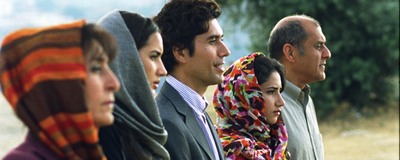Love, rebellion and homosexuality in Iran in the movie 'Circumstance'
"Circumstance" is currently playing at the Michigan Theater in downtown Ann Arbor. Have you seen "Circumstance?" Leave your comments and critiques after the jump.

Nikohl Boosheri, Sarah Kazemi, and Rezo Sixo Safai star in "Circumstance"
imdb.com
Maryam Keshavarz's debut film, "Circumstance," is a movie about youth in revolt and young, forbidden love in repressive modern Iran. Its stars, all themselves Iranian ex-patriots, tell the story of an underground scene of secret night clubs and protest where sexual self-expression and subversive activism are inextricably tanged—especially among two young females whose passionate lesbian love affair exists stifled under the weight of fundamentalism and sexual inequality.
Atafeh (Nikohl Boosheri) and Shireen (Sarah Kazemi) are two hot-blooded teenage girls who crave the freedom and sexual expression that exists in the Tehranian underground: in essence to be rowdy and take part in the sexual and personal exploration that American youths often overindulge in. Atafeh and Shireen share a passionate, secretive love affair that exists at night and in longing glances until it is threatened by the return of Atafeh's brother, Mahreen (Reza Sixo Safai), from prison.
Mahreen's rehabilitation from jail and the crack addiction that places him there precipitates a conversion to Iranian Shi'a Islam, putting him squarely in the dominant position in Iranian society as a male and a Muslim fundamentalist. In the mosque he finds himself rubbing shoulders with the country's morality police and only too willingly turns the forces of repression on his own family, especially his sister and Shireen.
It is therefore only a matter of time, in movie terms, before the brother Mahreen desires Shireen and endeavors to tear their forbidden love apart and take his sister's lover for himself.
While the plot may be a come off a bit obvious and standard, the setting and the actors' verve makes it feel vibrant and fresh. Filming was done on location in Lebanon as a proxy for that Tehranian feel that the production team could not, retaining any semblance of freedom or safety, capture in Iran. The social and sexual repression that they represent in the film was real enough for the director and actors that they made sure to take one last vacation back to Iran to revisit friends and family before embarking on filming.
They even had to obfuscate and mask the film's homosexual relationship filming in another country. Scenes of love between the two girls had to be hidden from the Lebanese authorities.
The film is overtly sexual, almost relishing in the girls' sexuality as they share and explore it for themselves. It risks bordering at times on cheap titillation but because it is so clearly predicated on forbidden self-expression, it has a bittersweet quality that might ultimately thwart any voyeuristic impulses in the audience. Which is good, because cinematic exhibitionism would detract from the message that the movie is trying to get across.
There are some great moments of clever cinematography in "Circumstance." One scene in particular, with Atafeh's family at the beach, has casually framed and slightly out of focus in the background a woman in a full black veil attending to three male friends, all laughing and dripping from a dip in the water. And they're all in Speedos. Atafeh's father chuckles one day, hopefully, they will all be able to go for a swim together but as he took part in the revolution that led Iran to its current repressive state, there is little hope for positive change in him.
Like many directorial debuts, Keshavarz's "Circumstance" puts allusions to the medium into its script. At one point, the characters undertake the redubbing of Gus Van Sant's 2008 film "Milk." This is again both a moment of free sexual expression and a kind of social rebellion as they plan to redistribute the film to provoke conversation among the population.
And none-too-subtly, that's exactly what "Circumstance" hopes to do with its viewers as well. It's not often that there comes a film about the rebellious youth underground in Iran and even more seldom that you see a narrative about the secret lives of gay women in the Middle East. "Circumstance" might be eye-opening for some or inspirational for others. It's quite clear why it was an audience favorite at the Sundance Film Festival. For a debut film, it's well-shot, passionately directed and with a few clever touches that really help convey the sense of suppression and hidden emotional lives of the people, the women of Iran.

